I honestly could not tell you why, but Australian crime fiction is absolutely shining with attention and love right now. Crime fiction in general has always been fascinating, but recently I am seeing more books set in my ‘own backyard,’ especially in the Australian Outback. This I can understand: the Outback is vast and open, with dusty red deserts, small population hubs, and lone trees standing like sentinels on the horizon. It’s an awesome setting for any dry, dark mystery and suspense. However, the cities have their fair share of shady characters, too. It stuns me how big our cities are compared with other countries. They’re big enough to lose people and big enough to drag you into the undercurrent of crime.
None of this is new, though. Australian crime fiction is rising in popularity, but often with stories that are inspired by the past. Our nation has both the oldest history in the world and one of the youngest acknowledgements. We know more about the white colonial history of the last 200 years than any other time period. There is still a large chunk of Aussies who would prefer Waltzing Matilda as the national anthem, and that’s a song about a larrikin sheep thief who would prefer to drown himself in a billabong than face the police. At least our crime fiction has improved since then. In fact, it’s improved a lot, hitting Best Seller lists around the world and inspiring international TV series like Big Little Lies and The Dry. Better still, we have greater access to stories from Indigenous writers and members of our multicultural communities. Because Australia is a land of storytellers, and it’s about time we heard more of them.
Author’s Note: I acknowledge and pay my respects to the Traditional Custodians of the lands and waters on which I stand; the Cammeraygal People of the Guringai Tribe of the Eora Nation. I pay my respects to all Aboriginal Elders, past, present, and emerging, and extend that respect to all Aboriginal and Torres Strait Islander people who read this article. I acknowledge and respect the vital contribution Indigenous people and cultures have made and still make to the nation we share and the literary community.
Outback Noir
Named as the area “out back,” beyond the cities, the Australian outback is the biggest open space you can possibly ever imagine. It is isolating and yet also peppered with small communities banding together in strength and determination. The whole ‘noir’ sub-genre loves a good isolating environment, with extreme climates and roughened people. Outback noir feels like the perfect evolution for crime fiction.
An Isolated Incident by Emily MaguireTwenty-five-year-old Bella Michaels was brutally murdered in the small town of Strathdee. Her older sister, Chris, is plunged into despair and starts her own personal quest to find out what happened. When the media descends on Strathdee to cover Bella’s story, Chris finds her own life caught up in the mayhem. This story, told through the perspective of Chris and visiting journalist May, pushes against the ‘male perspective’ of women in crime fiction. |
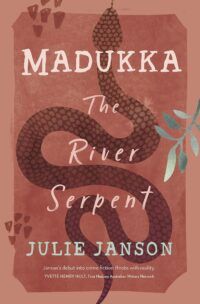
Madukka the River Serpent by Julie JansonAunty June is now one of my top five characters of all time. She completed her TAFE Cert III in Investigative Services online in under 30 hours and instantly set up her own PI Agency. She’ll take on anything: corruption, commercial cotton farmers, bikies, water theft, and unreliable local police. Aunty June will not stop fighting for her people and her land. Now, if you think that’s tough, imagine how formidable she is when Thommo (an environmental activist and her nephew) goes missing. Yep, Aunty June is absolutely one of my top five. |
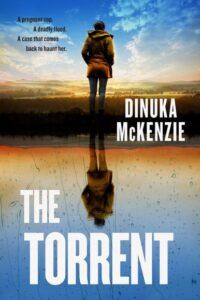
The Torrent by Dinuka McKenzieAussie country towns are supposed to be quiet. Of course, they’re not. Especially when Detective Sergeant Kate Miles is simply trying to wrap up her cases before going on maternity leave. Two cases have her working overtime to meet her deadline. A violent armed hold-up leaves a 16-year-old girl badly injured. The second, a follow-up for a young man who died in the floods a few months back. I loved the authentic landscape set in Northern NSW, as well as a character with a lifestyle and personality that was grounded and very real. A second book in the series was published in February 2023 and is on my TBR list. |
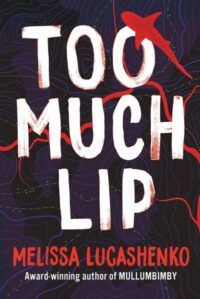
Too Much Lip by Melissa LucashenkoThis book was included in my previous list of books set in Australia, and it is worthy of the second mention! It’s a wild ride on the back of a stolen Harley Davidson down the throat of regional Australia. This is home to Karry Salter, fresh out of jail and straight into a family dispute and land grab with developers. It’s a hard-hitting story with plenty of dry Aussie laughs to lighten the mood at exactly the right moment. Perfect for Australian noir. |
Australian Cities of Crime
It’s easy to think of Australia as a small country down under the equator. But it’s not just the Outback that is overwhelming. Our cities are massive compared with some other countries, deceptively so. And like many cities, it is easy to be lost amongst the crowd, hidden by the shadows, and sometimes even disappear in the bright light of day. They are also a hub for people from all walks of life: the good, the bad, and those who lie within the underbelly itself.
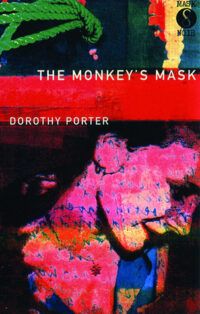
The Monkey’s Mask by Dorothy PorterThis book is totally unlike any other crime book you have ever read. It is an Australian lesbian erotic mystery presented in blank verse. It’s set in 1990s Sydney but it has really 1930s noir feels to it. Imagine Katherine Hepburn as the smokin’ hot PI, looking for a missing girl named Mickey. If that involves an in-depth interview with the girl’s teacher, then one could consider it the perks of the job. High on the erotic while still holding on to its crime-fiction label. |
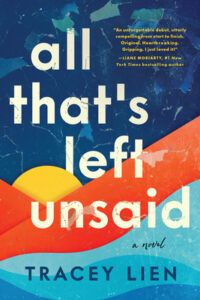
All That’s Left Unsaid by Tracey LienSometimes the evidence is hidden within the words we don’t say. Ky Tran’s brother was brutally murdered in a restaurant in Cabramatta while celebrating his graduation with friends. It’s all her fault. She was the one who told her parents to let him go out with his friends. Now Ky is trying to understand what happened, hindered by unhelpful police and a community drowning in criminal activity. There is a lot to unpack with systemic racism and intergenerational trauma (particularly post-Vietnam War), set against the worst heroin epidemic in Australian history. |
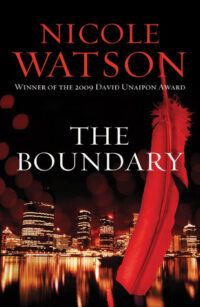
The Boundary by Nicole WatsonA failed Native Title claim is quickly followed by the death of both the Judge who rejected it and the corporate developer’s lawyer who opposed it. To be absolutely honest, it is hard to feel any empathy for those killed; the anger and volatility in the story are made palpable by the fairly recent Rio Tinto’s destruction of sacred Indigenous sites in Juukan Gorge. Watson captures every element of a good Australian noir story, shading between right and wrong with characters weighed down with complexity. |
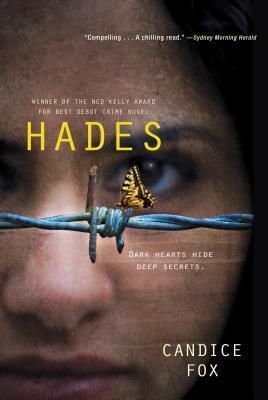
Hades by Candice FoxReady to trek into Sydney’s Underworld? Hades Archer is called Lord of the Underworld. He knows how to make anything disappear for a price. However, there is no price high enough to dispose of two small bodies — well, children. So, Hades chooses to keep them. Twenty years later, Eden and Eric are siblings in the Police force. Eden, freshly partnered with Frank, is on the case of a serial killer. The story is told from Frank’s perspective, as he tries to learn more about his partner and her brother while tracking down a serial killer who likes to leave puzzling clues. |
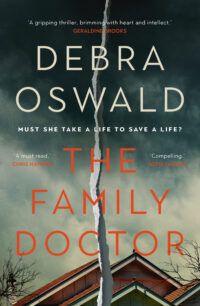
The Family Doctor by Debra OswaldHow far will we go to prevent horrible crimes from happening again? It’s a complicated dilemma, one that Oswald approaches with both excellent storytelling and deliberation. Paula is a GP (local doctor) in suburban Sydney. She is still recovering from the murder of her friend, Stacey, by Stacey’s estranged husband. Then a patient comes in with suspicious injuries and an anxious young son. Paula sees the warning signs, but the patient is terrified to leave her abusive husband. Driven by her own guilt for Stacey, Paula balances on the question of exactly what is the right thing to do. |
An Australian History of Crime
From our colonial history to the bushrangers running through regional Australia, we have a back catalogue of stories rich in inspiration for Australian crime fiction.
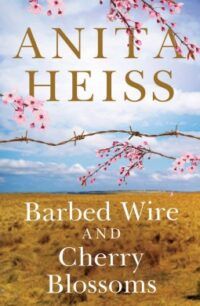
Barbed Wire and Cherry Blossoms by Anita HeissI was surprised to learn this fiction novel was based on the real escape of nearly 400 Japanese POW from a prison camp in Cowra (NSW). It was the largest prison break staged during World War II anywhere in the world, and I never learned about it during my school history lessons. Instead, I learnt of it from Heiss and her beautifully researched storytelling. It centres on Hiroshi, one Japanese soldier who makes it to the nearby Erambie Aboriginal. Banjo discovers Hiroshi and convinces the people of Erambie to offer him refuge. When his daughter Mary arrives from Sydney, she is curious to learn more about Hiroshi and soon develops a relationship with him. Unfortunately, this is during a time of great fear and horribly racist laws in Australia. Mary and Hiroshi’s relationship is illegal under the Acts of Protection and Assimilation, legislation created specifically to control and regulate the lives of Indigenous people. Right now, Australia has the opportunity to enshrine an Indigenous Voice to Parliament within our Constitution, and provide permanent representation and recognition for Aboriginal and Torres Strait Islanders within Australian federal matters (read more about it here). Barbed Wire and Cherry Blossoms is a reminder that crime can cover many aspects of our life; aspects we may not usually consider to be criminal, and we never want it to be ever again. #Yes23 |
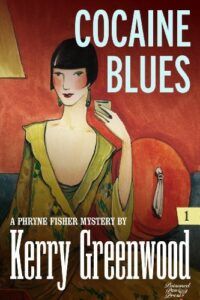
Cocaine Blues (Phryne Fisher #1) by Kerry GreenwoodSome of the best adventures are borne from the depths of boredom (or so I’ve been told and have yet to experience). Phryne Fisher is bored with the London season in the late 1920s. She swings into something completely different, as a lady detective based in Melbourne’s Hotel Windsor. From poisoned wives and cocaine smuggling to corrupt police and communism, Phryne solves crimes and still finds time to spice up her privileged life. It’s fun, it’s upbeat, and it’s a great glimpse into Melbourne’s history. And yes, it is the novel behind the TV series with the fabulous outfits. |
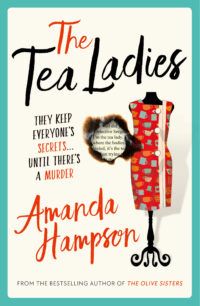
The Tea Ladies by Amanda HampsonA cosy mystery set in Sydney around 1965. Back then, many offices had Tea Ladies wheeling a trolley through every floor of a business, filled with tea, biscuits, and a little bit of gossip. Our ‘Tea Ladies’ are Hazel, Merl, Betty, and Irene; all working within Sydney’s rag trade district with the fashion manufacturers. Usually, the ladies meet on their own breaks to generally catch up. Then a warehouse near Hazel burns down and a body is found inside — the day after Hazel saw a woman ask for help from an upper window. The police are not interested, so Hazel and her friends take it upon themselves to investigate. The primary mystery is well-supported with side-steps into each of the characters and their histories. Hampson cleverly captures the essence of both Sydney and the time period, while building a full crime story balanced with the ladies’ friendship. |
For more great Australian fiction, check out our 100 Must Read Australian Books here. If you’re hooked on Australian Noir, check out these 4 Different Styles of Mystery Novels From Around the World here.
Source : Australian Noir and The Best Australian Crime Fiction










